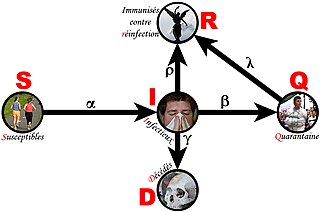In law, a proximate cause is an event sufficiently related to an injury that the courts deem the event to be the cause of that injury. There are two types of causation in the law: cause-in-fact, and proximate cause. Cause-in-fact is determined by the "but for" test: But for the action, the result would not have happened. The action is a necessary condition, but may not be a sufficient condition, for the resulting injury. A few circumstances exist where the but for test is ineffective. Since but-for causation is very easy to show, a second test is used to determine if an action is close enough to a harm in a "chain of events" to be legally valid. This test is called proximate cause. Proximate cause is a key principle of Insurance and is concerned with how the loss or damage actually occurred. There are several competing theories of proximate cause. For an act to be deemed to cause a harm, both tests must be met; proximate cause is a legal limitation on cause-in-fact.
Causality is what connects one process, the cause, with another process or state, the effect, where the cause is wholly or partially responsible for the effect; the former is hence said to be a cause of the latter. In general, a process has many causes, which are also said to be causal factors for it, and all lie in its past. An effect can in turn be a cause of, or causal factor for, many other effects, which all lie in its future. Multiple philosophers have believed that causality is metaphysically prior to notions of time and space.
In statistics, many statistical tests calculate correlations between variables and when two variables are found to be correlated, it is tempting to assume that this shows that one variable causes the other. That "correlation proves causation" is considered a questionable cause logical fallacy when two events occurring together are taken to have established a cause-and-effect relationship. This fallacy is also known as cum hoc ergo propter hoc, Latin for "with this, therefore because of this", and "false cause". A similar fallacy, that an event that followed another was necessarily a consequence of the first event, is the post hoc ergo propter hoc fallacy.
Determinism is the philosophical idea that all events, including moral choices, are determined completely by previously existing causes. Determinism is at times understood to preclude free will because it entails that humans cannot act otherwise than they do. It can also be called hard determinism from this point of view. Hard determinism is a position on the relationship of determinism to free will. The theory holds that the universe is utterly rational because complete knowledge of any given situation assures that unerring knowledge of its future is also possible. Some philosophers suggest variants around this basic definition. Deterministic theories throughout the history of philosophy have sprung from diverse and sometimes overlapping motives and considerations. The opposite of determinism is some kind of indeterminism. Determinism is often contrasted with free will.
The problem of induction is the philosophical question of whether inductive reasoning leads to knowledge understood in the classic philosophical sense, highlighting the apparent lack of justification for:
- Generalizing about the properties of a class of objects based on some number of observations of particular instances of that class or
- Presupposing that a sequence of events in the future will occur as it always has in the past. Hume called this the principle of uniformity of nature.
Moral reasoning, also known as moral development, is a study in psychology that overlaps with moral philosophy. Children can make moral decisions about what is right and wrong from a young age; this makes morality fundamental to the human condition. Moral reasoning, however, is a part of morality that occurs both within and between individuals. Prominent contributors to this theory include Lawrence Kohlberg and Elliot Turiel. The term is sometimes used in a different sense: reasoning under conditions of uncertainty, such as those commonly obtained in a court of law. It is this sense that gave rise to the phrase, "To a moral certainty;" however, this idea is now seldom used outside of charges to juries.
Agency is the capacity of an actor to act in a given environment. The capacity to act does not at first imply a specific moral dimension to the ability to make the choice to act, and moral agency is therefore a distinct concept. In sociology, an agent is an individual engaging with the social structure. Notably, though, the primacy of social structure vs. individual capacity with regard to persons' actions is debated within sociology. This debate concerns, at least partly, the level of reflexivity an agent may possess.
Jaegwon Kim is a Korean-American philosopher who is now an emeritus professor at Brown University, but who also taught at several other leading American universities. He is best known for his work on mental causation, the mind-body problem and the metaphysics of supervenience and events. Key themes in his work include: a rejection of Cartesian metaphysics, the limitations of strict psychophysical identity, supervenience, and the individuation of events. Kim's work on these and other contemporary metaphysical and epistemological issues is well represented by the papers collected in Supervenience and Mind: Selected Philosophical Essays (1993).
"Instrumental rationality" is a term commonly used in philosophy to refer to the human use of operational reasoning in the creation of technical knowledge to manipulate the world. "Value rationality" refers to a related process of reasoning about the ends of such manipulation, via moral or spiritual processes.
Causation is the "causal relationship between the defendant's conduct and end result". In other words, causation provides a means of connecting conduct with a resulting effect, typically an injury. In criminal law, it is defined as the actus reus from which the specific injury or other effect arose and is combined with mens rea to comprise the elements of guilt. Causation only applies where a result has been achieved and therefore is immaterial with regard to inchoate offenses.
Adaptive expertise is a broad construct that encompasses a range of cognitive, motivational, and personality-related components, as well as habits of mind and dispositions. Generally, problem-solvers demonstrate adaptive expertise when they are able to efficiently solve previously encountered tasks and generate new procedures for new tasks. This definition can be contrasted with more traditional ideas of expertise popularized by Chi and others, which do not typically consider adaptation to completely novel situations. Its empirical validity has been examined in a number of training and learning contexts. The term was first coined by Giyoo Hatano and Kayoko Inagaki, to tease out the variability within groups of experts. Hatano and Inagaki, described two types of expertise: routine expertise, or classic expertise, and adaptive expertise. They defined routine expertise as involving mastering procedures in such a way as to become highly efficient and accurate, whereas developing adaptive expertise requires an individual to develop conceptual understanding that allows the "expert" to invent new solutions to problems and even new procedures for solving problems. To illustrate, imagine two sushi chefs: one who makes every piece perfectly but routinely makes the same few types over and over, and one produces new menus frequently. To some, this is an unfair comparison,as ones' environment supports behavior. For example, the routine of the classic expert sushi chef may be tied to his restaurant environment, and this chef may be able to break out of the routines easily given a different situation. However, the adaptive expert chef clearly demonstrates flexible knowledge and performance of sushi-making. Learning Scientists are interested in adaptive expertise, in part because they would like to understand the types of learning trajectories that may allow practitioners break free from routines when necessary.

Bailey v Ministry of Defence [2008] EWCA Civ 883 is an English tort law case. It concerns the problematic question of factual causation, and the interplay of the "but for" test and its relaxation through a "material contribution" test.
Clark N. Glymour is the Alumni University Professor in the Department of Philosophy at Carnegie Mellon University. He is also a senior research scientist at the Florida Institute for Human and Machine Cognition.

Management accounting principles (MAP) were developed to serve the core needs of internal management to improve decision support objectives, internal business processes, resource application, customer value, and capacity utilization needed to achieve corporate goals in an optimal manner. Another term often used for management accounting principles for these purposes is managerial costing principles. The two management accounting principles are:
- Principle of Causality and,
- Principle of Analogy.
Causal inference is the process of drawing a conclusion about a causal connection based on the conditions of the occurrence of an effect. The main difference between causal inference and inference of association is that the former analyzes the response of the effect variable when the cause is changed. The science of why things occur is called etiology. Causal inference is an example of causal reasoning.

The discipline of forensic epidemiology (FE) is a hybrid of principles and practices common to both forensic medicine and epidemiology. FE is directed at filling the gap between clinical judgment and epidemiologic data for determinations of causality in civil lawsuits and criminal prosecution and defense.
MasterChef Korea Celebrity is a South Korean competitive cooking game show. It is spin-off of MasterChef Korea, itself an adaptation of the British show MasterChef, and features celebrity contestants. The program was broadcast on O'live from February 22 to April 12, 2013 for 8 episodes. The last winner received ₩100,000,000 and a refrigerator of the sponsor as prize.









